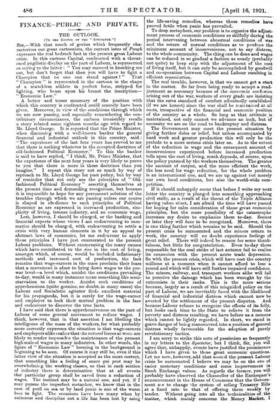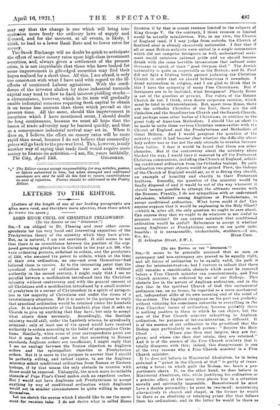FINANCE—PUBLIC AND PRIVATE.
.111.0 OUTLOOK.
[To THE EDITOR OF THE " spEcuros.-] Sau,—With that touch of genius which frequently cha- racterizes our great cartoonists, the current issue of Punch expresses the real bedrock fact in the present great Labour crisis. In this cartoon Capital, confronted with a threat- ened pugilistic display on the part of Labour, is represented as saying to the latter : " You may succeed in knocking me out, but don't forget that then you will have to fight a Champion that no one can stand against I " That " Champion " is represented in the cartoon in the shape of a matchless athlete in perfect form, stripped for fighting, who bears upon his breast the inscription- " Economic Law."
A better- and terser summary of the position with which this country is confronted could scarcely have been given. Moreover, in view of the conditions through which we are now passing, and especially remembering the con- tributory circumstances, the cartoon irresistibly recalls a story related, some eighteen months ago with regard to Mr. Lloyd George. It is reported that the Prime Minister, when discussing with a well-known banker the general financial and industrial outlook in this country, said : " The experience of the last four years has proved to me that there is nothing-whatever in the accepted doctrines of old-fashioned Political Economy." To this_ the banker is said to have replied,. " I think, Mr. Prime Minister, that the experience of the-next four years is very likely to prove to you that there is more in those doctrines than you imagine." I repeat this story not so much by way of reproach to Mr. Lloyd. George for past policy, but by way of reminder that not only are the principles of " Old- fashioned. Political Economy " asserting themselves at the present time and demanding recognition, but because it is impossible to hope for any permanent solution of the troubles through which. we are passing unless .our course is shaped in obedience to such principles of Political Economy as are expressed in increased production, sim- plicity of living, intense industry, and an economic wage..
Lest, however, I should be charged, or the banking and financial experts whose views I am endeavouring to sum- marize should be charged, with endeavouring to settle a crisis with very human elements in it by an appeal to abstract laws of economics, let me endeavour to apply- those principles I have just enumerated to the present Labour problems. Without enumerating the many causes which have contributed to the rise in the cost of living, amongst_ which, of course, would, be included inflationary methods and increased cost of production; the fact remains that wage-earners in the mass proclaim their.fears that a movement is.afoot to bring down wages to the pre- war level—a level which, amidst the conditions prevailing to-day, would in many instances mean something. like semi- starvation to . the worker. Amidst such conditions of apprehensions (quite genuine, no doubt, in many cases) the Labour and Socialistic agitator finds excellent material for his .propaganda, but it is surely for the wage-earner and employer to look their mutual problem in the face and endeavour to discover the true facts.
I have said that there is apprehensiveness on the part of Labour of some general movement to reduce wages. I. think, however, that in that assertion I am libelling the intelligence of the masa of the workers, for what probably more correctly expresses the situation is that wage-earners and employers alike.realize that the natural forces at wore are likely to render impossib!e the maintenance of the present high scale of wages in many industries. In other words, the figure of " Economic Law " looming -in the background is. Beginning to be seen. Of course it-may still be, even if this latter view of the situation is accepted as the more correct, that something like a feeling of sauve qui peat may be overwhelming the working classes, so that in each section of industry there is determination that at . all events that particular group shall be saved from a reduction of wages. The instinct may be a natural one, and yet, if I may pursue the imperfect metaphor, we know that in the case of peril. on sea or by land panic is one of the worst foes, to fight. The occasions have been many when by calmness and discipli;►e not a_ life has, been lost by using the life-saving remedies, whereas those remedies have proved. futile when panic has prevailed: To drop metaphors,, our-problem is to organize the acust- meat process of economic conditions so skilfully during the period intervening between abnormal conditions. of war and the return of normal conditions as to produce the minimum amount- of inconvenience, not to say distress, to the whole community. The thing can be done and wages can be reduced in so gradual a fashion as nearly (probably not quite) to keep step with the adjustment of the cost of living itself, but it can only be accomplished by goodwill and co-operation between Capital and Labour resulting in efficient organization.
The real trouble, however, is that we cannot get a start in the matter. So far from being ready to accept a read- justment as necessary because- of the • economic confusion arising out of the war, workers of every grade are insisting that the extra standard of comfort admittedly established (if we are honest) since the war shall be maintained at all costs, irrespective of the financial and economic position of the country as a whole.. So long as that attitude is maintained, not only cannot we advance an inch; but of necessity we are on the road to bankruptcy and distress. The Government may meet the present situation by giving further doles or relief, but unless accompanied by hard work and greater production this will only be the prelude to a more serious crisis later on. As to the extent of the reduction in wage and the consequent amount of inconvenience experienced before increased. production tells upon the cost of living, muchdepends, of course, upon the policy pursued by the workers themselves. The greater the amount of output, and the more efficient the work, the less need for wage reduction, for- the whole problem is an international one, and we are up against not merely our own local conditions, but also the, world-wide com- petition.
If it should unhappily occur that before I write my -next letter the country is plunged into something approaching civil strife, as- a. result of the threat of the Triple Alliance having taken efiect, I am afraid the time will have passed for hoping for calm consideration of those great economic principles, but the mere possibility of the catastrophe increases my desire to' emphasize them to-day. Sooner or later they will have to be recognized.. Moreover, there is one thing further which-remains to be said. Should the present crisis be surmounted and the miners- return to work, the country will no doubt experience feelings of great relief. There will indeed be reason for some thank- fulness, but little for congratulation: Even to-day those responsible for the coal strike of last autumn fail to realize its connexion with the present acute trade depression. So with the present crisis, which will have cost the country millions at a moment when it cannot afford to lose a.
pound and which will have still further impaired. confidence. The- miners, railway, and transport workers alike will fail to perceive the damage which has been wrought by the extremists in their ranks. This is the more serious because, largely as a result of this misguided policy- on the part of Labour, we are inevitably faced with the likelihood of financial and industrial distress which cannot now be averted by the settlement of the present disputes. And because Labour refuses to recognize the effects of its folly, but looks each time to'.the State to relieve it from the poverty and distress resulting,' we• have before us a menace which cannot be lightly regarded. In short,. we- stand in grave danger of being manoeuvred into a position: of general distress wholly favourable- for the adoption of purely revolutionary tactics. I am sorry to strike this note of pessimism so frequently in my letters to the Spectator,. but I think, Sir, you will agree that, unhappily, events have justified the prominence which. I have given to these great economic questions.. Let me now, however;add 'that &timed the, present Labour crisis be surmounted .I believe we may be on the eve of easier monetary conditions and some improvement in Stock Exchange values. As regards the .former, you will probably have- observed, the Chancellor of the Exchequer's, announcement in the House of Commons that the Gavern- ment are to change the system of selling Treasury Billie' at a fixed rate to that of offering: them weekly by tender. Without going into all the technicalities of. the matter, which, mainly concerns the Money Market, 1 may say that the change is one which will bring into operation more freely the ordinary laws of supply and demand, and for the moment, at all events, is likely, I think, to lead to a lower Bank Rate and to lower rates for money.
The Stock Exchange will no doubt be quick to anticipate the effect of easier money rates upon high-class investment securities, and., always given a settlement of the present crisis, it is not improbable that those who have looked for some improvement in gilt-edged securities may find their hopes realized for a short time. All this, I am afraid, is only too consistent with what I have said with regard to the ill- effects of continued Labour agitations. With the confi- dence of the investor shaken by these industrial turmoils capital may tend to flow to fixed interest-yielding stocks— a circumstance, however, which in its turn will gradually enable industrial concerns requiring fresh capital to obtain it on terms less onerous than those which prevail at the present time. All the same, should this improvement in securities which I have mentioned. occur, I should doubt its long continuance, because we must all hope that the lesson of trade adversity may be learned quickly, and that as a consequence industrial revival may set in. When it does so, I believe the effect on money rates will be more rapid than usual, because I do not believe that commodity prices will go back to the pre-war level. This, however, is only another way of saying that trade itself would require more money to finance its activities.-1 am, Sir, yours faithfully,



































 Previous page
Previous page